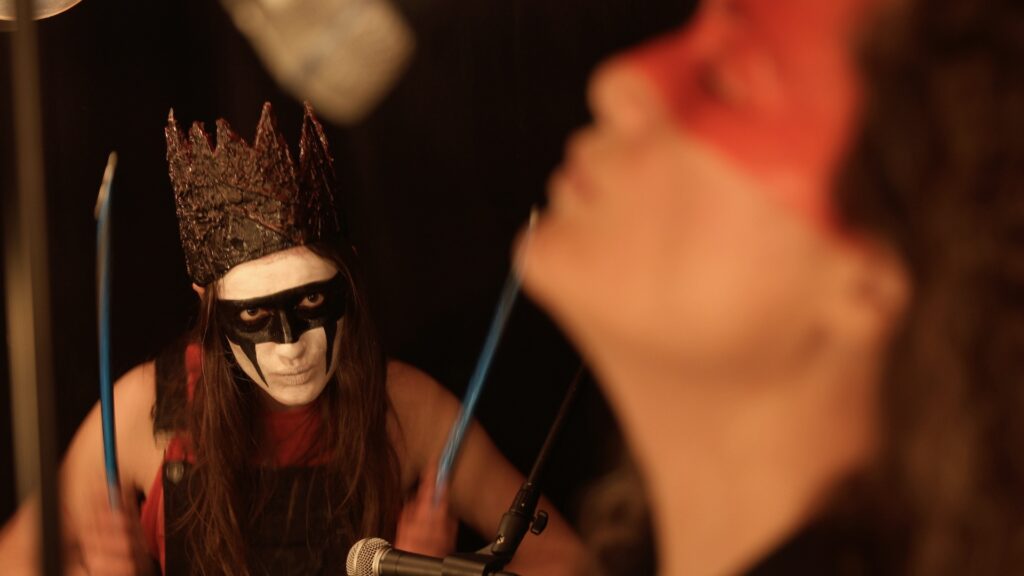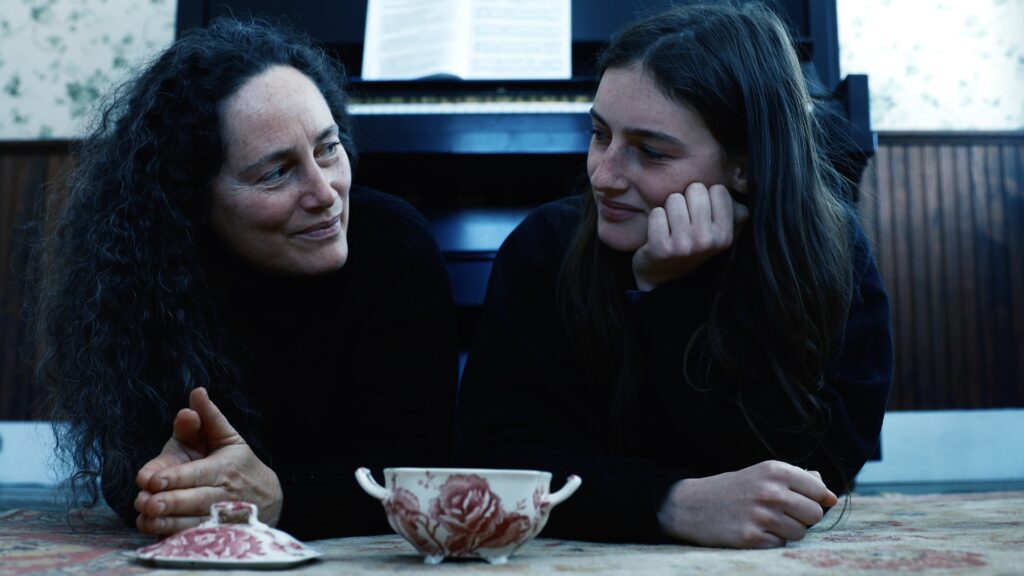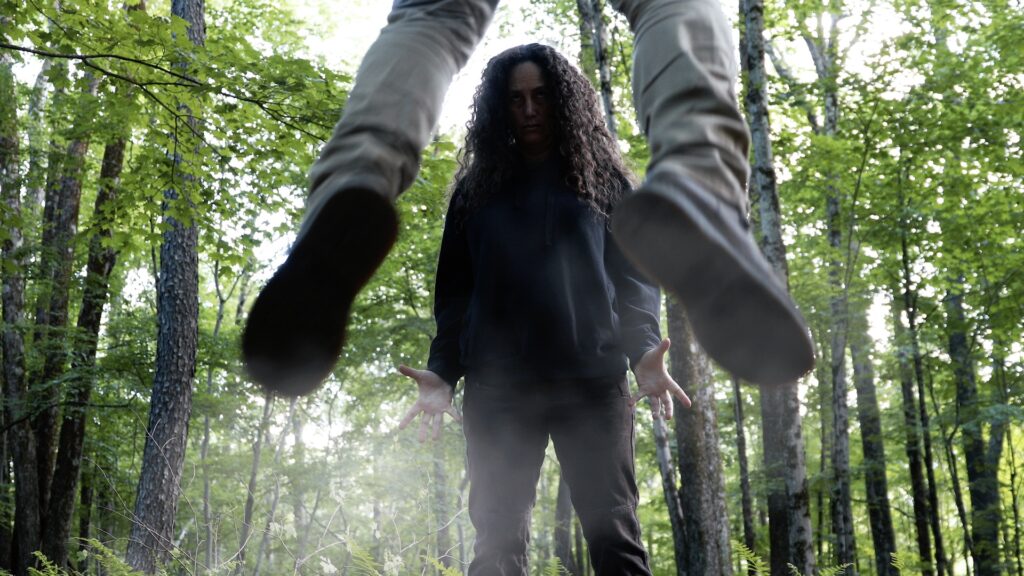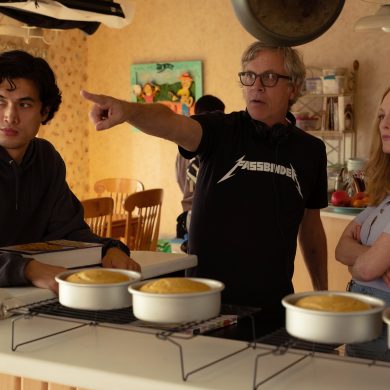Hellbender is a new folk horror film from filmmakers Toby Poser, Zelda Adams, and John Adams which launches on Shudder on February 24th. Made in the beautiful remote wilderness of America, Hellbender features an impressive relationship between mother and daughter (on screen and off) with Toby Poser’s Mother and Zelda Adams Izzy, bouncing off each other with masterful ease. Mother knows the power that lives within Izzy, raising her to believe that their life of solitude is because of Izzy’s immunocompromised state. But there’s more to it than she’s letting on.
In this joyous interview with Toby, Andrew asks her about her filmmaking process, the joy of nature, and the comfort of working with family and creating stories together.
Read Nadine’s review of Hellbender here.


Thanks for giving me your time to have a chat about this really quite fascinating film. I had so much fun with it. And it’s not what I expected. Congratulations. It’s always nice to have something a little bit unexpected.
Thank you.
The main question you’re probably going to get asked for a lot of these interviews is this is a real family affair. What’s it like working with your family? Not just yourself, but having your daughters involved in telling something that is really quite a family-focused story as well. What’s that like?
It’s the most wonderful thing in the world.
We’ve been doing this for twelve years now since Zelda was six and Lulu – who plays Amber in the film – was eleven. And Hellbender was our sixth feature. So we like it. I think after the first one (Rumblestrips), we were kind of sold. It’s a wonderful gift to be able to be creative with your family. And while you’re being creative living. I mean, our life and our art are now so intertwined I don’t know where one ends and the other begins and it’s fun. And convenient too.
Because you’re all living in like the same locale. Is that correct? I want to use the word “commune”, but it doesn’t feel like it’s a commune. Because that has strange connotations.
It’s definitely commune-like. Lulu graduated from college two years ago, so she doesn’t live with us. But she’s actually with us at the moment and we’re shooting our next film with her. For Hellbender, she was living in the northwest in beautiful Oregon. And because of COVID, Zelda was distance-learning anyway, virtually learning. So we just took off and we travelled for eight months and went out and shot with Lulu, and shot all over the country.
It looks so beautiful as well. It’s kind of refreshing to be able to see the forest, to see so much green as well. Being in Australia, I’m used to the dryness, so getting to see a lush, vibrant forest, which kind of reinforces the narrative of Hellbender too is really beautiful. Can you talk about the visual style and visual choices for the film too?
Sure. Yeah, nature is our favorite actress, we’d like to say. She’s our Norma Desmond who always just wants her close-up, you know? We take clues from her.
Because we are such a tiny unit and we use a simple camera and we don’t have lights, we just use natural light, basically. We’re kind of always at the ready to shoot anywhere at any time. So most of our stuff is outside. Our last film, The Deeper You Dig, was a very wintry movie, and we loved it. Blood on the snow looks so good. It’s very stark and cinematic.
And at first, we were nervous that Hellbender looked too beautiful. You know, like lush, beautiful and jungly and verdant, and we were like “This is not creepy.” And then we realised, “Wait a minute. This is telling us something. Nature in its lushness is beautiful. But it’s also brutal.” I mean, we’d go for hikes, and that deer in the movie – there is a deer carcass we come across – that was just on a hike, scouting. We realised, “Oh no, nature in its full robust glory can be equally frightening because it’s powerful.” And there’s the other side of it which is it’s gonna die and rot.
There’s that natural breaking down process. And it is very much — when that deer carcass turns up, I’m like, “How did they make this?” And I’m like, “No, that’s got to be real.” Like the use of practical effects is so good.
Nature really threw us a bone that day.
So was that part of the script and you had already planned to have that in there? Or you found it and it then evolved into that?
We found it. We ran home right away and got into our proper clothing and hiked back to it and built a scene around it on, on the drive to and from.
That’s really exciting. The conversations about what you’re going to include in the films that you’ve been making — how do they originate? Where do the ideas come from? Is it you all sitting around the dining table, and then go, “I’ve got this idea”? I understand with this that Zelda was like, “I really want to make a horror film.” Does it just spin off from there?
You know what, when you said “dinner table”, you hit the nail on the head. We call it ‘slinging spaghetti’. Because we just sling these spaghetti ideas and see what sticks and often they are over a spaghetti meal, or tonight I made a beautiful curry, and as we were eating the curry, we were talking about where we’re going to shoot tomorrow. It’s very immersive and interactive with what we’re doing in our life.
A few hours ago, we were shooting and then we thought, “You know what, let’s just go have a quick lunch.” And we were covered in blood. And we could drive five miles, eat our lunch, and then go back and commence shooting again. It’s very like in the moment for us. We don’t plan, we do write a little bit. But it’s usually just a template from which we kind of jump off.
Where does this passion for filmmaking come from? This is as independent as it comes. When I look at American independent cinema, I get so excited because I see filmmakers like you and your family creating these grand works, which feel like they’re kind of rejecting the mainstream in a lot of ways. And that’s really exciting. So where does that passion come from?
I love that question, Andrew. Thank you. Well, we’re cinephiles, we constantly are watching movies. In fact, for filmmakers, we have the lousiest film-watching setup you can imagine. We’re on our little queen-sized bed, four of us crushed like sardines on this bed. We put our little laptop on top of a laundry basket. Our wifi sucks. And often we just spend a lot of time watching the circle of death. And then we talk about what we like about the film, popcorn gets in the sheets. We watched a lot of films.
And we also love making films. We try to kind of move around as much as we can while we’re shooting because as a family, it’s just cool and it’s fun. And we want to make something that gets us into film festivals. Sometimes I think we want to make films just to get to the festivals, because we love meeting fellow filmmakers, we love watching what they’ve created. We learned so much. We love films and we just love making them. Simple as that.
When I was growing up, my family decided when I was quite young that we would go around for a trip around Australia, to see all of Australia, and I was maybe eight, nine years of age at the time. And they said that was the best education you could have because you get to see the world and get to see the place that I live in. As a parent, is that the same mentality that you have with your kids going, “All right, we can take them around and get them to see America and learn from America”?
Oh, yeah. I mean, books are great. I love books. But there’s kind of nothing like looking out your window and learning (about) what’s right in front of you. And, traversing a country as large as Australia or the United States, you’re gonna see a lot, you’re going to learn a lot, you’re going to meet a lot of different people. We made two films on the road, our first film Rumblestrips, and then Hellbender – a lot of it was on the road too. And we homeschooled while we were doing both those trips. And some of the time I never even cracked a book for the kids. It was like “What’s outside? Let’s study that tree. Let’s study the people who have been here for hundreds of years before us.” We’re completely inspired by our environment, and we always see something new, even when we retrace our steps which we do a lot.
With Hellbender, there’s this really great moment – and I’ll try to steer around spoilers because I think this is a film that is best going into not knowing what’s going to happen – but there is this wonderful relationship between you and Zelda in the film that is this push and pull relationship where you know the truth and she doesn’t. And it’s not gaslighting as such, but there is an aspect of it. I’m curious how you discuss playing that out? And how you both discussed what to explore in those scenes together? And how was it exploring those scenes with Zelda?
The funniest thing about working with my kid is that we’re actually incredibly close. We were much more in character at the beginning of the film, and then, toward the end, I think it was strange to be at odds. Zelda is just an extremely powerful young woman, but I certainly want her to fly the coop, and I don’t want her devour her neighbour. But I want her to be her authentic self.
In the case of a mother and Hellbender, I’d like to think that at least half the people might understand and sympathise with her. I think it for me it’s a success if half of the audience thinks, “You know what, that mother is starving her daughter of her true nature.” And then the other half says, “No, but can you blame her? She knows what she’s headed for, a life of loneliness and violence.” Which one is right? Is it okay to be a wolf or coyote that wants to eat a lamb when that’s their nature? It probably is. Well, it is. But in the case of someone in human form, it’s a little trickier. We have a lot of fun. And I love working with Zelda, she’s just a tremendously deep person to bounce off of.
She’s got great screen presence, too. She just really inhabits the screen perfectly. There are three directors here, there are three writers, and I’m curious how that creative process works when you’re directing. How do you know who’s going to direct which scene? What’s the discussion that takes place there?
That’s a cool question. You know what, we’re a complete democracy. If we don’t agree on something, we shoot it three different ways. And then we kind of duke it out in the editing. The cream always kind of rises to the top and we know whose vision was better once John’s editing, and Zelda and I sit there and boss him around sometimes.
What’s it like for John as well? He seems to be obviously sitting back a little bit for this one in particular. But how does his creative involvement play in this too? Is he mostly the editing force here?
I always say John is our engine. Because without John, probably nothing would get done. Because he’s like a shark, he cannot stop swimming, he cannot stop doing something. So that’s great. And then I’m sort of like Hamlet, I have to overthink everything. And so we’re a good balance in that way. And Zelda just makes it all look good. Because she has such a good eye, you know. And so between the three of us, it’s a nice kind of triangular balance.
It’s really exciting to see. There’s a moment later on where you both vomit blood on each other’s faces. And it’s just like the joy and the excitement that you’re both have in that moment is tangible. What was that like?
(laughs) We do have fun. We don’t vomit on each other, but we laugh so hard sometimes that we cry. We really wanted that to be a moment of joy before everything hits the fan. It was fun. It was cold because we were in the snow. And I didn’t tell Zelda that I put little pieces of rice in there to be like maggots. So when I puked on her and some of it got in her mouth, she was mortified. (laughs)
(laughs) Well, that would be a little bit unsettling, that’s for sure. It adds a surprise to the scene but it’s great. It comes back to the practical nature of Hellbender. I really love the tactile nature of the film, like you can feel it. Nadine who is one of the writers for the site – she’s written the review for it. And in her review, she’s compared this to The Blair Witch Project obviously not just because of the witch aspect, but the handmade aspect, the tactile aspect of it. For you, are there any touchstones of horror cinema that you looked at and went, “This is an inspiration”?
Not truly. Zelda loves the movie Raw. So I think she was influenced in that one scene in the movie from Raw, which I won’t give away. But for me, I don’t think we even knew we were making a folk horror until we were kind of making it. We knew that nature was gonna be this lodestar thematically for us. But we didn’t set out to make a witchy movie. We even didn’t want to mention the word “witch”, we only mentioned it once. And I think Zelda’s character is just throwing this human ranger, this pitiful man something that he can relate to by saying, “Oh, we’re like a cross between a witch, a demon, and an apex predator.” But she’s like, “Oh my god, we are so much more than that.”
As a general rule, we like to watch films and get in the mood or be inspired. But we then want to forget what almost inspired us, because it’s really important for us – especially with the mythology that we created in Hellbender – to create something original. And in this case, we wanted to work on a really rudimentary crude level with the magic, and that was so much fun.
If anything, I was inspired just from my childhood, playing in the mud. Like how would they make these spells? What were the poems I said while jumping a rope? It was my very early memories of being just a kid in the woods that inspired me the most.
It’s all on the film. It’s all there on screen. And I just loved it. I thought it was so much fun. And it’s the kind of film that I can’t wait to get behind and support and say, “People, you got to watch this.” And it’s great that it’s going to be on Shudder because everybody’s got Shudder now. So it’s great to be able to go “Go and watch this.” Congratulations to you.
It really is. Of all the platforms out there, it’s the only one that I go to and I have no problem picking something out. In fact, I have a problem not picking something out on the first page that opens when I open my computer. Whereas if I go on other platforms, I’m just looking at page after page and I’m like, “Hundreds of movies and I have nothing to watch.” But that’s not the same with Shudder.
No, no. And everybody’s gonna be excited to be able to watch this. So congratulations, and thank you so much for your time, Toby. I really appreciate it. It’s been wonderful chatting with you.
Thank you, Andrew. It’s been wonderful for me. I appreciate you. Thank you.






